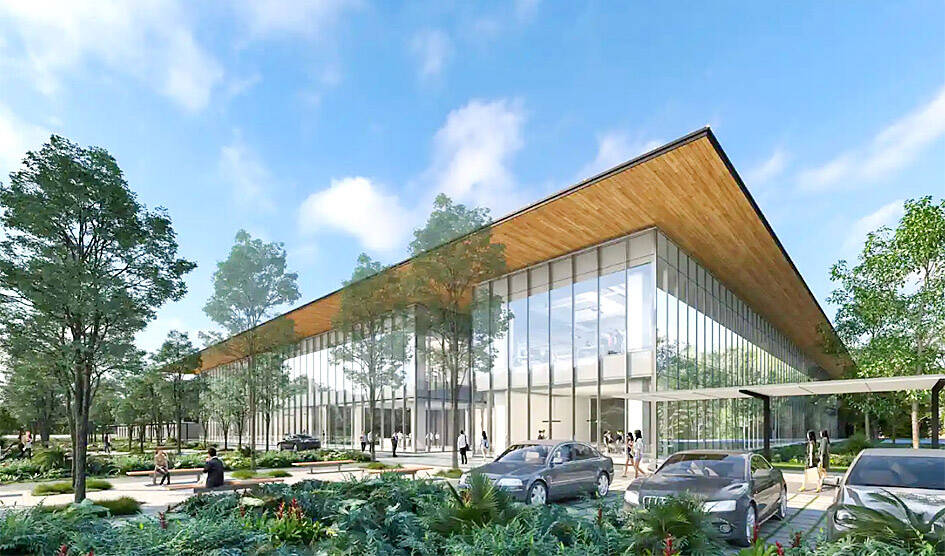High-end appliance maker Dyson Ltd yesterday said that it would open a new factory in Singapore to manufacture next-generation batteries, as well as new facilities elsewhere to boost its research into artificial intelligence (AI) and software development.
At the size of 53 basketball courts, Dyson said the new plant was expected to be fully operational by 2025 and would be its most significant investment in advanced manufacturing.
PROPRIETARY TECH

Photo courtesy of Dyson
The company said research teams had been working globally on proprietary new technology for batteries, which would be assembled in a “smart, digitally enabled environment.”
Dyson — famous for its bagless vacuum cleaners, among other gadgets — started its in-house battery program more than a decade ago, aiming to make them more sustainable and energy dense.
Besides the new plant, the Singapore-headquartered firm also announced plans to set up research and development (R&D) centers in the UK and the Philippines, all part of its £2.75 billion (US$3.4 billion) five-year investment plan.
The company did not specify how much the new battery plant would cost on its own.
FUTURE DRIVERS
The researchers at the new center in the Philippines would focus on AI and robotics, among other areas, and the firm said it intended to hire an additional 450 engineers.
The R&D center in Bristol, England, is expected to be “working on a pipeline of products that stretches 10 years into the future,” the electronics giant said.
“Software, connectivity, AI, and proprietary new technology batteries will power the next generation of Dyson technology,” founder James Dyson said.

When an apartment comes up for rent in Germany’s big cities, hundreds of prospective tenants often queue down the street to view it, but the acute shortage of affordable housing is getting scant attention ahead of today’s snap general election. “Housing is one of the main problems for people, but nobody talks about it, nobody takes it seriously,” said Andreas Ibel, president of Build Europe, an association representing housing developers. Migration and the sluggish economy top the list of voters’ concerns, but analysts say housing policy fails to break through as returns on investment take time to register, making the

‘SILVER LINING’: Although the news caused TSMC to fall on the local market, an analyst said that as tariffs are not set to go into effect until April, there is still time for negotiations US President Donald Trump on Tuesday said that he would likely impose tariffs on semiconductor, automobile and pharmaceutical imports of about 25 percent, with an announcement coming as soon as April 2 in a move that would represent a dramatic widening of the US leader’s trade war. “I probably will tell you that on April 2, but it’ll be in the neighborhood of 25 percent,” Trump told reporters at his Mar-a-Lago club when asked about his plan for auto tariffs. Asked about similar levies on pharmaceutical drugs and semiconductors, the president said that “it’ll be 25 percent and higher, and it’ll

CHIP BOOM: Revenue for the semiconductor industry is set to reach US$1 trillion by 2032, opening up opportunities for the chip pacakging and testing company, it said ASE Technology Holding Co (日月光投控), the world’s largest provider of outsourced semiconductor assembly and test (OSAT) services, yesterday launched a new advanced manufacturing facility in Penang, Malaysia, aiming to meet growing demand for emerging technologies such as generative artificial intelligence (AI) applications. The US$300 million facility is a critical step in expanding ASE’s global footprint, offering an alternative for customers from the US, Europe, Japan, South Korea and China to assemble and test chips outside of Taiwan amid efforts to diversify supply chains. The plant, the company’s fifth in Malaysia, is part of a strategic expansion plan that would more than triple

Taiwanese artificial intelligence (AI) server makers are expected to make major investments in Texas in May after US President Donald Trump’s first 100 days in office and amid his rising tariff threats, Taiwan Electrical and Electronic Manufacturers’ Association (TEEMA, 台灣電子電機公會) chairman Richard Lee (李詩欽) said yesterday. The association led a delegation of seven AI server manufacturers to Washington, as well as the US states of California, Texas and New Mexico, to discuss land and tax issues, as Taiwanese firms speed up their production plans in the US with many of them seeing Texas as their top option for investment, Lee said. The